3 Read, 1 reading, 2 to read
This is a series that I’m trying to get going at work. This is my go at fulfilling this format.
Read
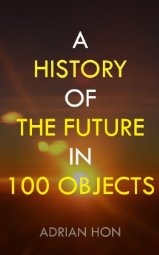 A History of the future in 100 objects – Adrian Hon
A History of the future in 100 objects – Adrian Hon
“[T]here is virtue in working less and flourishing more — pursuing what makes us humans, not automatons.”
Inspired by the British Museum exhibition and Radio 4 series A history of the world in 100 objects, this attempts to speculate as to what a historian living in 2087 would think were the pertinent objects from this century. Unsurprisingly from the title, this is 100 short chapters explaining each of the objects (or often creations - political structures, legal frameworks etc.). These build on each other as they go along to develop a surprisingly rich understanding of how the next three quarters of a century pans out.
I found that I could follow a thread easily from my current model of the world to Hon’s future model. It’s fairly easy reading, but it leaves your mind churning over the possibilities implied by each chapter. Interestingly it was also funded by a Kickstarter campaign. I saw a lot of parallels between Hon’s view of the future and the speculative fiction of Neal Stephenson, and in the acknowledgements (at the end) he credits him as an influencer.
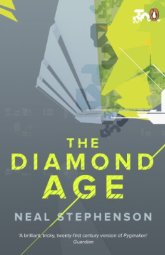 The Diamond Age – Neal Stephenson
The Diamond Age – Neal Stephenson
“The House of the Venerable and Inscrutable Colonel was what they called it when they were speaking Chinese. Venerable because of his goatee, white as the dogwood blossom, a badge of unimpeachable credibility in Confucian eyes. Inscrutable because he had gone to his grave without divulging the Secret of the Eleven Herbs and Spices.”
I have to admit that I’ve recently become a bit of a Neal Stephenson obsessive, I’ve spent more time than I care to admit on his work since Matthew gave me a copy of Cryptonomicon about a year ago. Aesthetically The Diamond Age is steampunk, but the core of relates to education and class structures. Its subtitle is a Young Lady’s Illustrated Primer, and is about how a girl comes into possession of, and then is educated by, a magical book[1. it’s really nanotech, but lets not forget that “Any sufficiently advanced technology is indistinguishable from magic.” - Arthur C. Clarke]. (Specifically with the goal of subversive critical thinking.)
After a slightly odd start, this is probably a pretty safe intro to Stephenson’s worlds. The quote above is a nice example of the way that he is able to swing between educational and sarcastic in the same sentence. Reading on the kindle lets me look up the meaning of archaic words easily too.
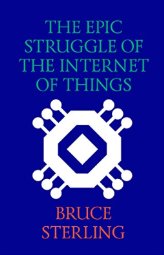 The epic struggle of the internet of things – Bruce Sterling
The epic struggle of the internet of things – Bruce Sterling
“The internet, although beloved by all including Al Qaeda, went straight from barbarism to decadence without ever encountering a civilisation.”
“It’s like a 30-year-old Zuckerberg bestowing vast sums on a symbolic virtual-reality gizmo, merely to show that the young prince is not to be trifled with in his march to futurity.”
“telephone companies are a proud and ancient people who hate and fear the internet and seethe with vengeful rebellion”
This is one of the latest crop of Strelka books. I read this as a rest while I was battling with The Amazons (below). After reading a thousand pages of the Diamond Age and the relatively slow-moving, non-fiction of steppe nomad women it was a breeze. Bruce Sterling is a sci fi author, so unlike most technical writers, he’s great at using words to evoke ideas rather than just relaying about specifications.
The gist of the book is that the internet of things is political, and that understanding those politics gives one an edge over one’s fellow citizens. There is little that we can do about things getting internetted, but we can manoeuvre through those things as in a more informed way.
Reading
I’m going to cheat a little as I’m reading these two in parallel.
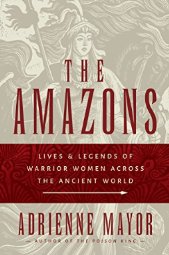 The Amazons – Adrienne Mayor
The Amazons – Adrienne Mayor
KING IASOS WANTED ONLY SONS. HE LEFT HIS INFANT daughter to die on a mountainside in Arcadia, the rugged highlands of southern Greece. A mother bear nursed the abandoned baby. Hunters found the feral girl and named her Atalanta. Like a female Tarzan, Atalanta was a natural athlete and hunter.
Kindle has a new feature where you can switch between reading and listening to the audio book. I haven’t been highlighting as I go along so that quote is the opening paragraph.
The Amazons were nomadic steppe tribes from about 500 BCE. They were contemporaneous with the Greeks and they were often buried in very cold or very dry places (meaning there are preserved burials) so there is an unusual amount know about them. The book takes a methodical approach to examining the aspects and myths around them
There seems to have been very little sexual inequality in their society. Mayor (citing plenty of sources) attributes this to them being the first people to domesticate horses. Their skeletons show men and women with fatal war injuries and greek vase paintings show them fighting - and winning - against Hoplites and heroes.
It’s tough going, but really interesting. I’d listen to Wrath of the Khans to find out if stories about horse archers is your thing.
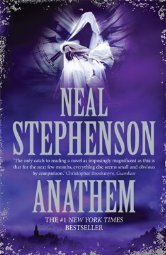 Anathem - Neal Stephenson
Anathem - Neal Stephenson
“Ideas are good things to have even if they are old. Even to understand the most advanced theorics requires a lifetime of study. To keep the existing stock of ideas alive r<p>I have to admit that I’ve recently become a bit of a Neal Stephenson obsessive, I’ve spent more time than I care to admit on his work since Matthew gave me a copy of Cryptonomicon about a year ago. Aesthetically The Diamond Age is steampunk, but the core of relates to education and class structures. Its subtitle is a Young Lady’s Illustrated Primer, and is about how a girl comes into possession of, and then is educated by, a magical book[^1]. (Specifically with the goal of subversive critical thinking.)
After a slightly odd start, this is probably a pretty safe intro to Stephenson’s worlds. The quote above is a nice example of the way that he is able to swing between educational and sarcastic in the same sentence. Reading on the kindle lets me look up the meaning of archaic words easily too.
The epic struggle of the internet of things – Bruce Sterling
“The internet, although beloved by all including Al Qaeda, went straight from barbarism to decadence without ever encountering a civilisation.”
“It’s like a 30-year-old Zuckerberg bestowing vast sums on a symbolic virtual-reality gizmo, merely to show that the young prince is not to be trifled with in his march to futurity.”
“telephone companies are a proud and ancient people who hate and fear the internet and seethe with vengeful rebellion”
This is one of the latest crop of Strelka books. I read this as a rest while I was battling with The Amazons (below). After reading a thousand pages of the Diamond Age and the relatively slow-moving, non-fiction of steppe nomad women it was a breeze. Bruce Sterling is a sci fi author, so unlike most technical writers, he’s great at using words to evoke ideas rather than just relaying about specifications.
The gist of the book is that the internet of things is political, and that understanding those politics gives one an edge over one’s fellow citizens. There is little that we can do about things getting internetted, but we can manoeuvre through those things as in a more informed way.
Reading
I’m going to cheat a little as I’m reading these two in parallel.
The Amazons – Adrienne Mayor
KING IASOS WANTED ONLY SONS. HE LEFT HIS INFANT daughter to die on a mountainside in Arcadia, the rugged highlands of southern Greece. A mother bear nursed the abandoned baby. Hunters found the feral girl and named her Atalanta. Like a female Tarzan, Atalanta was a natural athlete and hunter.
Kindle has a new feature where you can switch between reading and listening to the audio book. I haven’t been highlighting as I go along so that quote is the opening paragraph.
The Amazons were nomadic steppe tribes from about 500 BCE. They were contemporaneous with the Greeks and they were often buried in very cold or very dry places (meaning there are preserved burials) so there is an unusual amount know about them. The book takes a methodical approach to examining the aspects and myths around them
There seems to have been very little sexual inequality in their society. Mayor (citing plenty of sources) attributes thull” src=”/assets/B00O3RWJZ0.01.SX255_SY255_TTXW_SCLZZZZZZZ.jpg” alt=”B00O3RWJZ0.01.SX255_SY255_TTXW_SCLZZZZZZZ” width=”160” height=”255” /></a></h2> <blockquote><p>a tri-annual journal of the stylish, the horrific, and the transgressive, with a more-than-liberal seasoning of weird. Within these pages you will find explorations of human (and non-human) sexuality with a wide emotional range.
If anyone has any suggestions, I’m all ears!
“Ideas are good things to have even if they are old. Even to understand the most advanced theorics requires a lifetime of study. To keep the existing stock of ideas alive rull” src=”/assets/B00O3RWJZ0.01.SX255_SY255_TTXW_SCLZZZZZZZ.jpg” alt=”B00O3RWJZ0.01.SX255_SY255_TTXW_SCLZZZZZZZ” width=”160” height=”255” /></a></h2> [^1]: it’s really nanotech, but lets not forget that “Any sufficiently advanced technology is indistinguishable from magic.” - Arthur C. Clarke